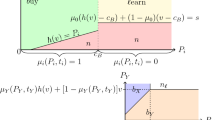Abstract
Optimal screening is one of the basic models of contracting under incomplete information, and we study the problem in a quality pricing application. We present a simple numerical method for solving the pricing problem when the firm has limited information about the buyers’ utility functions. In the method, the firm learns the optimal price schedule as the demand data is collected. We examine what the firm can learn about the preferences by observing the sales, and how the revealed information can be used in adjusting the quality-price bundles to increase the profit. We analyze the properties of the solution and derive the first-order optimality conditions under different assumptions. We show that the problem can be solved by making use of these optimality conditions together with the buyers’ marginal valuations. The firm can estimate the marginal valuations either by offering linear tariffs or by selling test bundles near the current solution.
Similar content being viewed by others
References
Anand, K. S., & Aron, R. (2003). Group buying on the web: A comparison of price-discovery mechanisms. Management Science, 49(11), 1546–1562.
Armstrong, M. (1996). Multiproduct nonlinear pricing. Econometrica, 64, 51–75.
Aron, R., Sundararajan, A., & Viswanathan, S. (2006). Intelligent agents in electronic markets for information goods: Customization, preference revelation and pricing. Decision Support Systems, 41, 764–786.
Basov, S. (2005). Multidimensional screening. Heidelberg: Springer.
Berg, K., & Ehtamo, H. (2008). Multidimensional screening: Online computation and limited information. In ICEC 2008: ACM international conference proceeding series: Vol. 42. Proceedings of the 10th international conference on electronic commerce. Innsbruck, Austria.
Brooks, C. H., Gazzale, R. S., Das, R., Kephart, J. O., Mackie-Mason, J. K., & Durfee, E. H. (2002). Model selection in an information economy: Choosing what to learn. Computational Intelligence, 18(4), 566–582.
Carlier, G. (2002). Nonparametric adverse selection problems. Annals of Operations Research, 114, 71–82.
Conitzer, V., & Sandholm, T. (2002). Complexity of mechanism design. In Proceedings of the 18th annual conference on uncertainty in artificial intelligence (UAI-02) (pp. 103–111).
Creane, A. (2002). Uncertain product quality, optimal pricing and product development. Annals of Operations Research, 114, 83–103.
Dash, R. K., Jennings, N. R., & Parkes, D. C. (2003). Computational-mechanism design: A call to arms. IEEE Intelligent Systems: Special Issue on Agents and Markets, 18, 40–47.
Ehtamo, H., Kitti, M., & Hämäläinen, R. P. (2002). Recent studies on incentive design problems. In G. Zaccour (Ed.), Advances in computational management science: Vol. 5. Optimal control and differential games, Essays in honor of Steffen Jorgensen (pp. 121–134).
Ehtamo, H., Berg, K., & Kitti, M. (2009). An adjustment scheme for nonlinear pricing problem with two buyers. European Journal of Operational Research. doi:10.1016/j.ejor.2009.01.037.
Elmaghraby, W., & Keskinocak, P. (2003). Dynamic pricing in the presence of inventory considerations: Research overview, current practices, and future directions. Management Science, 49(10), 1287–1309.
Fudenberg, D., & Tirole, J. (1991). Game theory. Cambridge: MIT Press.
Fudenberg, D., & Levine, D. K. (1999). The theory of learning in games. Cambridge: MIT Press.
Geoffrion, A. M., & Krishnan, R. (2003). Special issue on e-business and management science. Management Science, 49(10–11).
Mas-Colell, A., Whinston, M. D., & Green, J. R. (1995). Microeconomic theory. New York: Oxford University Press.
Maskin, E., & Riley, J. (1984). Monopoly with incomplete information. The RAND Journal of Economics, 15, 171–196.
Mirrlees, J. A. (1971). An exploration in the theory of optimum income taxation. Review of Economic Studies, 38, 175–208.
Mussa, M., & Rosen, S. (1978). Monopoly and product quality. Journal of Economic Theory, 18, 301–317.
Nisan, N., & Ronen, A. (2001). Algorithmic mechanism design. Games and Economic Behavior, 35, 166–196.
Raju, C. V. L., Narahari, Y., & Ravikumar, K. (2006). Learning dynamic prices in electronic retail markets with customer segmentation. Annals of Operations Research, 143, 59–75.
Rochet, J.-C., & Chone, P. (1998). Ironing, sweeping, and multidimensional screening. Econometrica, 66, 783–826.
Rochet, J.-C., & Stole, L. A. (2003). The economics of multidimensional screening. In M. Dewatripont, L. P. Hansen, & S. J. Turnovsky (Eds.), Advances in economics and econometrics, theory and applications, Eighth World Congress, Cambridge.
Räsänen, M., Ruusunen, J., & Hämäläinen, R. P. (1997). Optimal tariff design under consumer self-selection. Energy Economics, 19, 151–167.
Sandholm, T. (2007). Perspectives on multiagent learning. Artificial Intelligence, 171, 382–391.
Spence, M. (1980). Multi-product quantity-dependent prices and profitability constraints. Review of Economic Studies, 47, 821–841.
Voelckner, F. (2006). An empirical comparison of methods measuring consumers’ willingness to pay. Marketing Letters, 17, 137–149.
Wertenbroch, K., & Skiera, B. (2002). Measuring consumers’ willingness to pay at the point of purchase. Journal of Marketing Research, 39(2), 228–241.
Wilson, R. (1993). Nonlinear pricing. New York: Oxford University Press.
Author information
Authors and Affiliations
Corresponding author
Rights and permissions
About this article
Cite this article
Berg, K., Ehtamo, H. Learning in nonlinear pricing with unknown utility functions. Ann Oper Res 172, 375–392 (2009). https://doi.org/10.1007/s10479-009-0640-2
Published:
Issue Date:
DOI: https://doi.org/10.1007/s10479-009-0640-2




